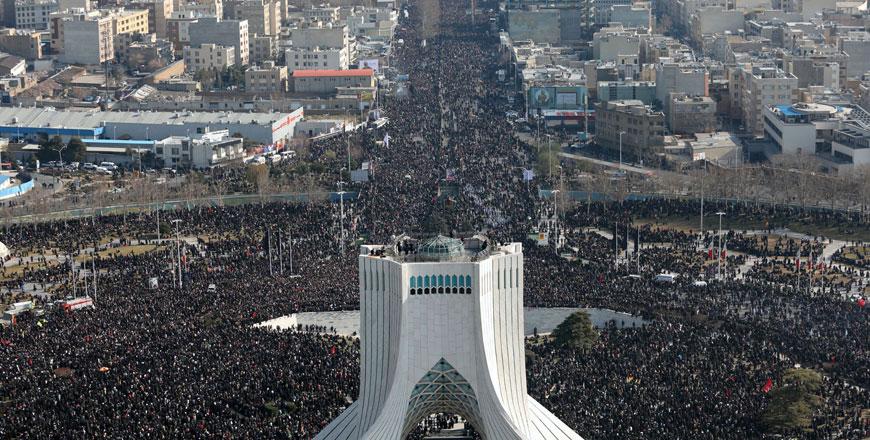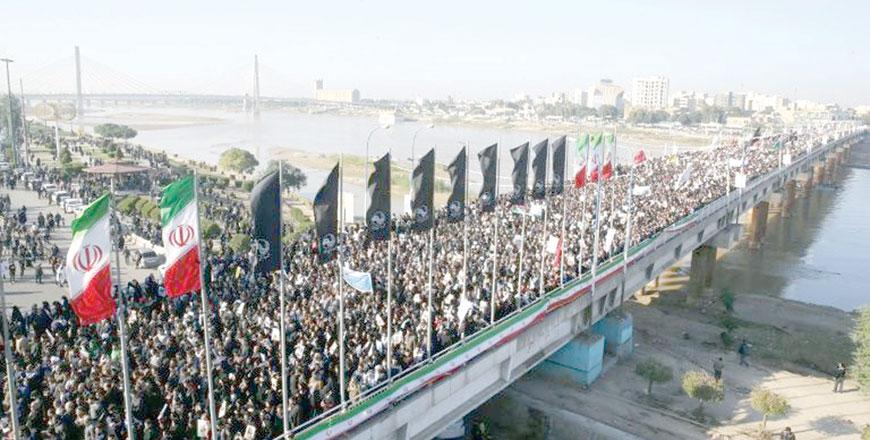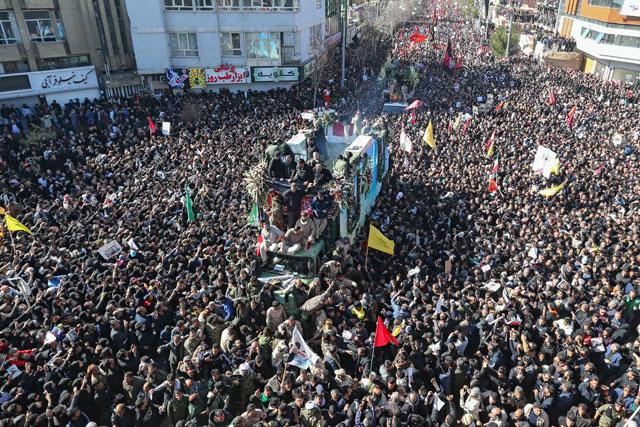You are here
'Down with USA': Crowds in Iran mourn general killed by America
By AFP - Jan 06,2020 - Last updated at Jan 06,2020

This handout photo provided by the office of Iran's Supreme leader Ayatollah Ali Khamenei on Monday shows Iranian mourners taking part in a funeral procession in Tehran for slain Iranian general Qassem Soleimani (AFP photo)
TEHRAN — A sea of black-clad Iranians on Monday mourned the top commander killed in last week's US drone strike that inflamed tensions across the Middle East as NATO ambassadors met to discuss the spiralling crisis.
Iranians clutching anti-American signs and portraits of their hero Qassem Soleimani massed as supreme leader Ayatollah Ali Khamenei presided over the emotional service for the slain head of the Revolutionary Guards' Quds Force.
The targeted killing of 62-year-old Soleimani ordered by US President Donald Trump saw the Islamic republic vow "severe revenge" before Tehran also took a further step back from the already tattered 2015 nuclear accord with world powers.
In an escalating war of words that has heightened international concern and rattled financial markets, Trump threatened yet more "major retaliation" if Tehran hits back, including strikes on Iranian cultural sites.
Iraq's parliament has, meanwhile, demanded the government expel the 5,200 American troops stationed in the country in response to the drone attack in Baghdad which also killed top Iraqi military figure Abu Mahdi Al Muhandis.
Trump has warned a forced departure of US troops would prompt sanctions against Iraq that would "make Iranian sanctions look somewhat tame".
NATO ambassadors were to hold an extraordinary meeting to "address the situation in the region," said the alliance, which has been forced to suspend its training mission in Iraq.
Ambassadors from the 29 allies were gathering at their Brussels headquarters with Secretary General Jens Stoltenberg expected to brief journalists afterwards.
Saudi Arabia’s Foreign Minister Prince Faisal Bin Farhan — whose US-allied country is seen vulnerable to Iranian counter strikes — also appealed for calm after a “very dangerous” escalation.
‘Crucial to de-escalate’
Germany joined France and Britain in urging Iran to refrain from taking “further violent actions or support for them”, or from steps that further weaken the 2015 nuclear deal.
“It is crucial now to de-escalate,” German Chancellor Angela Merkel, French President Emmanuel Macron and British Prime Minister Boris Johnson said in a joint statement on Sunday.
The EU’s diplomatic chief Josep Borrell said he “deeply regrets” Iran’s latest step back from the nuclear deal.
The agreement had offered Tehran relief from sanctions in return for curbs to prevent it acquiring nuclear weapons — but Trump’s withdrawal from it in 2018 dramatically weakened the agreement.
Despite its latest step Sunday, Iran insisted it will continue to fully cooperate with the UN agency overseeing its atomic programme.
The European leaders also pleaded with all parties to not jeopardise the ongoing battle against the Daesh terror group, which has lost its self-proclaimed “caliphate” but whose militants remain active.
Amid the geopolitical tensions in the oil-rich region, crude prices surged and most equities tumbled while the safe-haven commodity gold hit a more than six-year high.
‘Million-strong’
The raw emotions sparked by the US killing of Soleimani were on full display in Tehran, where mourners formed a sea of black, dotted with red Shiite flags and white signs, in what state television said was a “several million-strong” turnout.
“The last time I remember such a crowd was at Ayatollah Khomeini’s funeral 30 years ago,” said Maziar Khosravi, former head of the political department of the reformist daily Shargh.
As they marched down a main artery of the Iranian capital, the mourners chanted “Death to America” and “Death to Israel”.
Khamenei appeared to cry as he prayed over the flag-draped coffins containing the remains of Soleimani and five other “martyrs” killed in the strike.
He was flanked by President Hassan Rouhani and other top political and military figures as well as Soleimani’s son and the slain general’s replacement as Quds commander,
Esmail Qaani.
“We must give a crushing response,” a 61-year-old named Afkhami told AFP. “We must target whatever military base they have in the region.”
Soleimani’s daughter Zeinab and the leader of the Palestinian Islamist movement Hamas, Ismail Haniya, also delivered emotional speeches.
Zeinab said: “Stupid Trump — a symbol of stupidity and a toy in the hand of Zionism — don’t think that with the martyrdom of my father everything is over.”
The procession later made its way to Tehran’s vast Azadi Square, before Soleimani’s remains were flown to the holy city of Qom for a ceremony.
Soleimani was one of Iran’s most popular public figures, seen as a hero of the 1980-88 Iran-Iraq war.
He will be laid to rest in his hometown Kerman on Tuesday, in a martyrs’ cemetery next to a war veteran he used to fight alongside with.
NATO
Tehran should avoid “further violence and provocations”, NATO chief Jens Stoltenberg warned on Monday, as tensions mount in the Middle East after US forces killed a top Iranian general.
The warning came as the EU called an extraordinary meeting of foreign ministers in Brussels on Friday to discuss the fallout from the killing of Qasem Soleimani, head of Tehran’s Middle East operations as commander of the Revolutionary Guards’ Quds Force.
At a hastily-convened emergency session of NATO’s ruling council on Monday afternoon, US officials explained the thinking behind the decision to kill Soleimani at Baghdad airport on Friday — an operation that caught many of Washington’s allies by surprise.
Stoltenberg stressed that the drone strike, which killed at least 10 people, was a “US decision” but said the other 28 NATO members had repeated their longstanding concerns about Iran’s destabilising activities in the Middle East.
UNESCO
Both Iran and the United States must observe a convention obliging states to preserve cultural sites, the UN’s cultural agency said on Monday, after President Trump threatened to target Iran’s cultural heritage.
UNESCO Director General Audrey Azoulay highlighted that both Tehran and Washington had signed a 1972 convention prohibiting states from taking “any deliberate measures which might damage directly or indirectly the cultural and natural heritage” of other states.
At a meeting with the Iranian ambassador to the Paris-based organisation, Azoulay said that both countries had signed a 1954 convention for the protection of cultural property in the event of armed conflict, UNESCO said.
Azoulay “stressed the universality of cultural and natural heritage as vectors of peace and dialogue between peoples, which the international community has a duty to protect and preserve for future generations”.
Trump tweeted on Saturday that the United States would target some sites “at a very high level & important to Iran & the Iranian culture” if Tehran attacked American personnel or assets in retaliation for the killing of commander Qasem Soleimani.
Iran’s Foreign Minister Mohammad Javad Zarif said in return that such a move would be a “war crime”.
But Trump showed no sign of backing down from that threat on Sunday, saying: “They’re allowed to use roadside bombs and blow up our people. And we’re not allowed to touch their cultural site? It doesn’t work that way.”
Iran boasts 22 cultural sites on UNESCO’s world heritage list.
They include the majestic Meidan Imam square — also known as Naghsh-e Jahan — in the city of Isfahan that was built by shah Abbas I at the start of the 17th century.
The most outstanding site is considered by many to be the ancient Achaemenidian capital of Persepolis in southwest Iran, founded by Darius I in 518BC, and a major attraction for foreign tourists.
Related Articles
PARIS — Both Iran and the United States must observe a convention obliging states to preserve cultural sites, the UN's cultural agency said
TEHRAN — Black-clad mourners packed Iran's second city Mashhad on Sunday as the remains of top general Qassem Soleimani were paraded through
KERMAN, Iran — Dozens of people were crushed to death after a stampede broke out Tuesday during a massive funeral procession for a top Irani













